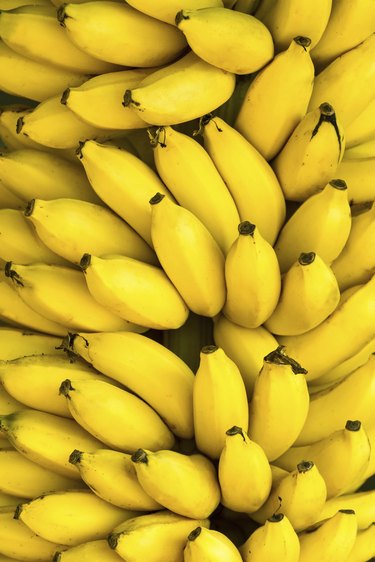
Sodium, along with potassium and chloride, make up the major electrolytes in the body. Each of these important nutrients is required for normal bodily function. Sodium, in the form of salt, is abundant in the human diet and excessive intake often leads to high blood pressure. Luckily, there is an inverse relationship between potassium and sodium that you can utilize, as a way to reduce the sodium in your body. As potassium levels rise, sodium levels decrease and vice versa. Through the consumption of potassium-rich foods or potassium supplements, you can help eliminate some of the excess sodium from your body.
High Salt Intake
Video of the Day
According to the American Heart Association, about 98 percent of Americans eat double the recommended amount of sodium, with a large majority of this coming from processed foods. This excessive sodium intake leads to high blood pressure, which increases the risk for heart disease and stroke. By keeping your daily sodium intake below 1500 mg per day, you can help lessen the burden on your heart. In addition to watching your sodium, potassium can serve as a powerful weapon in reducing sodium levels.
Video of the Day
Potassium Counteracts Sodium
When you consume more potassium, your body naturally excretes sodium through the urine. In addition, potassium can help lower blood pressure by helping the blood vessel walls to relax. Diets high in potassium are heart healthy and they promote overall good health. The American Heart Association recommends an intake of 4700 milligrams of potassium per day for adults. Rachel K. Johnson, Ph.D., M.P.H., R.D. told the American Heart Association that although a potassium-rich diet can be useful in lowering the amount of sodium in your body, it is still not an excuse to consume excessive amounts of sodium.
Potassium-Rich Foods and Supplements
To help eliminate sodium from your body, eat more potassium-rich fruits and vegetables such as sweet potatoes, peas, bananas, mushrooms, spinach, greens, tomatoes, oranges, lima beans, prunes, apricots, kiwi, cantaloupe, potatoes, winter squash, broccoli and raisins. All red meat, chicken, fish, milk, yogurt and nuts are good sources of potassium, as well. Potassium supplements are also used to raise potassium levels in the body. The NYU Langone Medical Center notes that potassium supplements are most effective for those who consume too much salt.
Safety Considerations
Potassium supplements are normally safe when taken at the correct doses. Those individuals who have kidney disease, however, may have trouble removing extra potassium from the body. In addition, potassium affects fluid levels in the body, which is why it is important to talk to your doctor before using potassium supplements if you have any medical conditions.